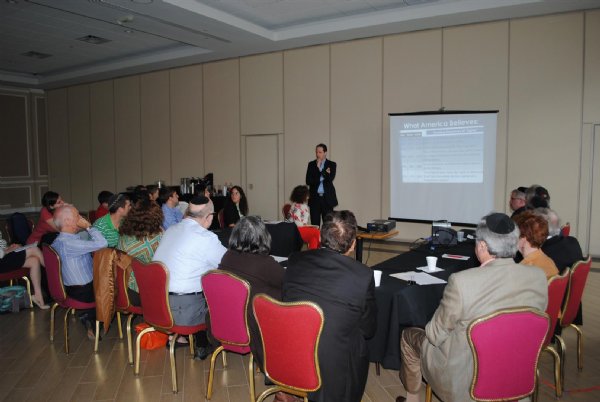|
head of what is expected to be an active year for anti-Israel forces at Rutgers University, Jewish community and student leaders were told by an advocacy expert that relationship-building is key to countering such efforts.
The campaign to boycott Israel targets groups its organizers feel are vulnerable and receptive, including progressives; the lesbian, gay, bisexual, and transgender community; and people of color, said David Dabscheck, deputy managing director of the Israel Action Network.
“The unpleasant reality is that Israel advocacy is speaking to people on the fence and getting them to do what we have to do,” he said.
Dabscheck spoke Sept. 22 at a meeting of the security committee of the New Jersey-Israel Commission. The gathering was held at Rutgers Chabad in New Brunswick, allowing Jewish leaders on campus to participate.
The Israel Action Network is affiliated with Jewish Federations of North America and the Jewish Council for Public Affairs.
Dabscheck is also cofounder and president of the nonprofit Community Security Service; he requested NJJN leave out specifics of his security advice, especially in dealing with critics of Israel, saying the other side previously had turned such information against the network.
Dabscheck said he is deeply immersed in the fight against the Boycott, Divestment, and Sanctions campaign, which, he noted, is not aimed at specific Israeli policies but rather at the entire country. “BDS is the global movement to demonize Israel and the sovereignty of the Jewish democratic state of Israel,” he said. “This should not be a left-right issue or a liberal-conservative issue or a Republican-Democratic issue, but one that unites us in the Jewish community.”
He said while polls have shown that Americans continue to support Israel overwhelmingly, that support is weakening among younger people.
One way to counter that is to show empathy toward the suffering of the Palestinians while “humanizing” the plight of Israelis.
“Having students connect and speak is much more powerful than anything they read in The New York Times,” said Dabscheck.
Campus leaders said they have heard that Rutgers — where a chapter of Students for Justice Palestine has sometimes clashed with pro-Israel groups — will be a targeted university again this school year. Rutgers Hillel executive director Andrew Getraer said the campus has so far been surprisingly quiet.
Each of the approximately 10 students at the meeting told committee chair Leonard Cole of Ridgewood they had felt some degree of discomfort or intimidation from anti-Israel sentiment on campus, whether it came subtly from a professor in class or a flyer or from direct confrontation.
Senior Talia Friedman of Teaneck, a Middle Eastern studies and economics major, said she has heard professors refer to Israel as Palestine during classes.
“It’s right on the map as the sovereign state of Israel,” said Friedman, a student leader at Chabad and a member of the Rutgers University Student Assembly. “When I tell them that it is the sovereign state of Israel, not Palestine, they say, ‘Right — Israel, formerly known as Palestine.’”
Getraer said pro-Israel students are unsure whether to confront anti-Israel factions because “they want to engage us in a public battle. We feed their fire.”
The previous day, a letter to the editor was published in the campus newspaper, The Daily Targum, from a board member of Students for Justice Palestine encouraging students to boycott Pepsi and urging the university to end its contract with the soft drink giant over its business dealings in Israel.
Getraer said he polled members of Hillel’s student Israel Facebook group, who “overwhelmingly” urged that the letter be ignored.
Rabbi Baruch Goodman of Rutgers Chabad said the Palestinian activism has had an effect on students who face “everyday intimidation from students on campus, from professors on campus.”
Dabscheck said he had heard positive things about the pro-Israel initiatives of both Chabad and Rutgers Hillel.
|

